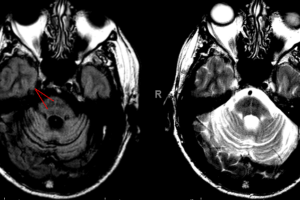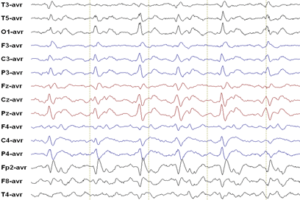Alzheimer’s dementia (AD) is the most common cause of dementia in western society. Disease specific treatments that are currently available do not appear to alter the course of the illness, though may slow or delay progression. Cholinesterase inhibitors and N-methyl-D-aspartate (NMDA) receptor antagonists are the only two classes of drugs currently approved by the FDA for the treatment of AD.
Cholinesterase Inhibitors
Mechanism of action: AD patients have been discovered to have decreased acetylcholine levels in the brain. Cholinesterase inhibitors augment cholinergic activity by increasing acetylcholine levels in the synaptic clefts.
Indications for use: May be used at any stage, though most clinical trials involving cholinesterase inhibitors have included patients with mild-moderate AD. Use of these agents in patients with severe AD remains unresolved.
Drugs in this class:
- Donepezil (Aricept)
- Rivastigmine (Exelon): Only one that is available in a patch formulation
- Galantamine (Razadyne)
Efficacy: Donepezil has shown to be slightly more effective than the other two drugs in this class. Studies show mild improvement in cognition, behavior, and daily functioning. These agents also appear to slow progression of AD for at least a year after initiation.
Common side effects of Aricept and the other cholinesterase inhibitors include nausea, vomiting, diarrhea, bradycardia, dizziness, and weight loss.
NMDA Receptor Antagonist
Mechanism of action: Glutamate is the primary excitatory neurotransmitter in the brain. It is believed that over-stimulation of the NMDA receptors by glutamate can lead to neurotoxicity and may play a role in neurodegenerative disorders. NMDA receptor antagonists decrease glutamate activity and are believed to be neuroprotective.
Indications for use: Memantine can be used at any stage of AD though randomized controlled trials have shown most benefit in patients with moderate to advanced AD.
Drugs in this class: Memantine (Namenda)
Common side effects on Namenda include dizziness, confusion, headache, and constipation
Treatment Strategies for Alzheimer’s Disease
- Cholinesterase inhibitors should be the first line of therapy for early or mild AD.
- If one cholinesterase inhibitor is ineffective, another agent in the same class may be tried.
- Memantine may be added to a cholinesterase inhibitor if monotherapy is not entirely effective.
- In patients with moderate to advanced dementia, NMDA receptor antagonists should be the first line of therapy, either as monotherapy or in addition to cholinesterase inhibitors.
- Use of any agent in severe dementia is controversial. Avoidance of side effects and polypharmacy should be the key goal in these patients.
Other Resources and References:
- Mayeux, Richard. MD. Early Alzheimer’s Disease. New England Journal of Medicine. June 10, 2010; 362: 2194-2201.
- Press, Daniel. M.D. etal. Treatment of Dementia. Uptodate.com.


